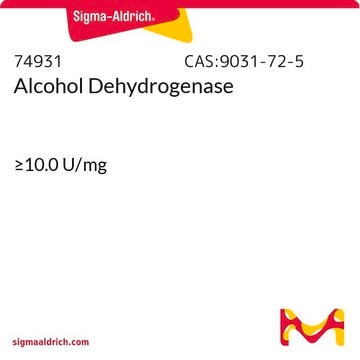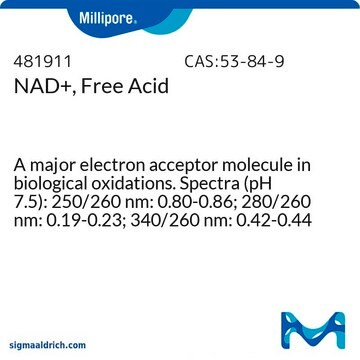N7160
NAD-ADH Reagent Multiple Test Vial
for alcohol determination
Synonym(s):
Ethanol assay reagent
Sign Into View Organizational & Contract Pricing
All Photos(1)
About This Item
UNSPSC Code:
41106305
NACRES:
NA.51
Recommended Products
Application
NAD-ADH Reagent Multiple Test Vial has been used to determine the alcohol content in blood. It has also been used to detect ethanol levels in mice.
Biochem/physiol Actions
Alcohol dehydrogenase (ADH) catalyzes the oxidation of alcohol to acetaldehyde with the simultaneous reduction of nicotinamide adenine dinucleotide (NAD) to NADH. The consequent increase in absorbance at 340 nm is directly proportional to alcohol concentration in the sample.
Other Notes
Vial contains ≥10 μmol of nicotinamide adenine dinucleotide (NAD) and ≥800 units of yeast alchohol dehydrogenase (ADH), buffer salts, and stabilizers.
Signal Word
Danger
Hazard Statements
Precautionary Statements
Hazard Classifications
Resp. Sens. 1
Storage Class Code
11 - Combustible Solids
WGK
WGK 3
Flash Point(F)
Not applicable
Flash Point(C)
Not applicable
Personal Protective Equipment
dust mask type N95 (US), Eyeshields, Gloves
Certificates of Analysis (COA)
Search for Certificates of Analysis (COA) by entering the products Lot/Batch Number. Lot and Batch Numbers can be found on a product’s label following the words ‘Lot’ or ‘Batch’.
Already Own This Product?
Find documentation for the products that you have recently purchased in the Document Library.
Customers Also Viewed
Ajay C Donepudi et al.
Hepatology communications, 2(1), 99-112 (2018-02-07)
Alcoholic fatty liver disease (AFLD) is a major risk factor for cirrhosis-associated liver diseases. Studies demonstrate that alcohol increases serum bile acids in humans and rodents. AFLD has been linked to cholestasis, although the physiologic relevance of increased bile acids
Tatsuro Kumada et al.
The Journal of neuroscience : the official journal of the Society for Neuroscience, 26(3), 742-756 (2006-01-20)
The brains of fetal alcohol syndrome patients exhibit impaired neuronal migration, but little is known about the mechanisms underlying this abnormality. Here we show that Ca2+ signaling and cyclic nucleotide signaling are the central targets of alcohol action in neuronal
A rapid enzymatic method for estimating ethanol in body fluids.
D Jones et al.
Clinical chemistry, 16(5), 402-407 (1970-05-01)
Denys V Volgin
Neuroscience letters, 439(2), 182-186 (2008-06-03)
Prenatal alcohol exposure (AE) is associated with lasting abnormalities of sleep and motor development, but the underlying mechanisms are unknown. We hypothesized that AE alters development of GABAergic signaling in the hypothalamic regions important for the control of sleep and
Ana M Romero et al.
Neurotoxicity research, 29(1), 69-79 (2015-08-13)
Chronic alcohol consumption may cause neurodevelopmental and neurodegenerative disorders. Alcohol neurotoxicity is associated with the production of acetaldehyde and reactive oxygen species that induce oxidative DNA damage. However, the molecular mechanisms by which ethanol disturbs the DNA damage response (DDR)
Our team of scientists has experience in all areas of research including Life Science, Material Science, Chemical Synthesis, Chromatography, Analytical and many others.
Contact Technical Service








